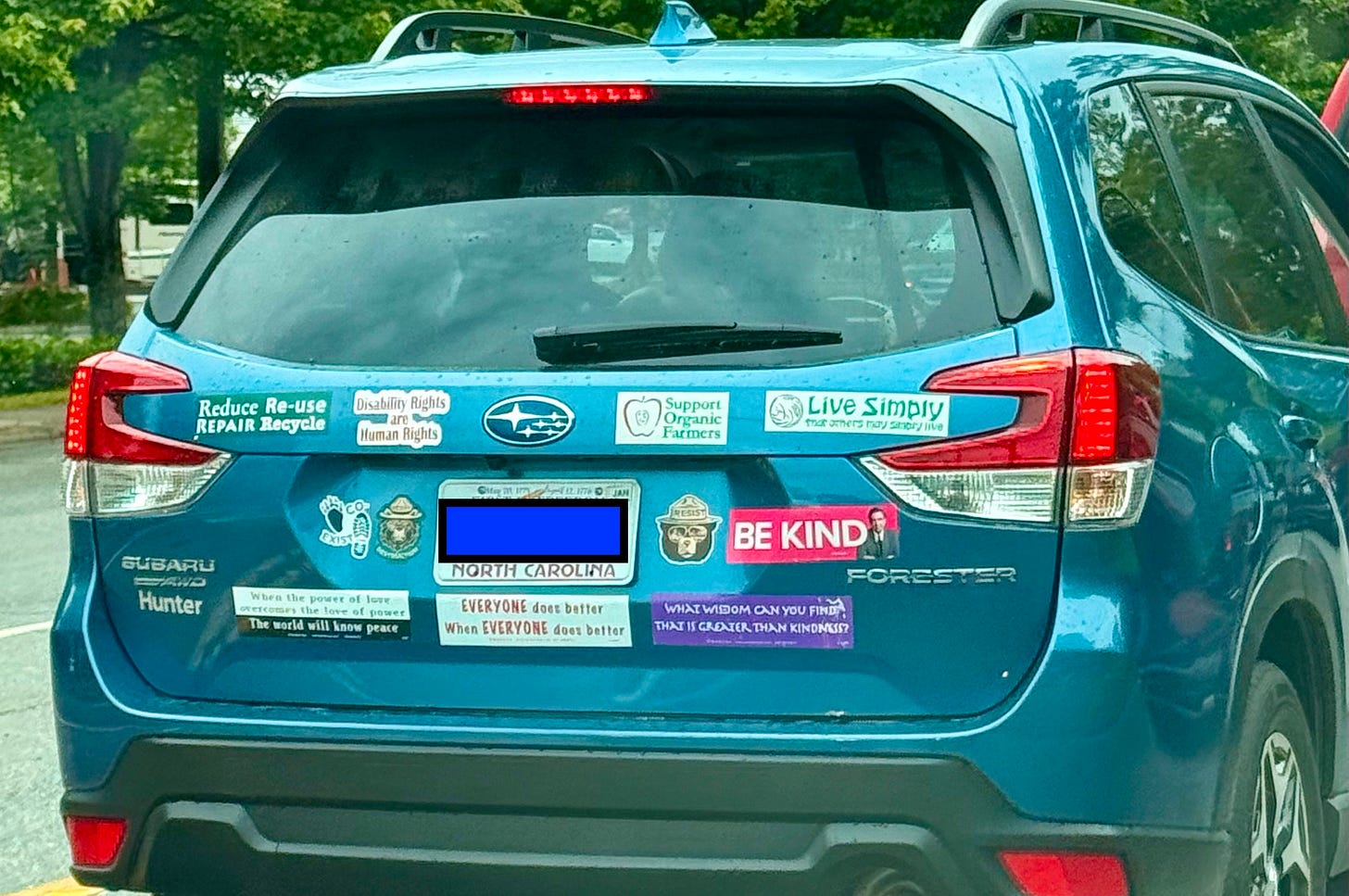What Bumper Stickers Tell Us About America
Tribalism, Loneliness, and Andrew Heaton's new book
Have you ever seen a car with more than three bumper stickers on it and thought, “Oh, this guy’s got it all together!”?
Neither have I.
A couple of years ago, I was at a stoplight behind a truck that the owner had plastered with beyond right-wing political rhetoric. A captive audience to his unhinged conspiracy theory, I was so impressed by his misguided passion that I took this photo.
Then last month, during a long weekend in the mountains of North Carolina, I found myself in a similar situation, but this time I was trailing the first guy’s progressive counterpart. She had festooned her car, a Subaru Forester (of course), with almost a dozen affirmations of environmental purity and social virtue. While less extreme, she was equally convinced her tailgate sermon was going to change my worldview. Or at least inspire me to compost.
These cars are America: Two people, radically different in ideology, yet strikingly similar in expression. Both so convinced of their own moral correctness and mission-critical urgency that they treat their vehicle—often a person’s most valuable asset—as a rolling campaign billboard. One driver thinks that our planet was made in six literal days. The other believes that men can have babies. Yet at some point, both stood there, looked at their nine bumper stickers, and thought, “You know what would really make a difference? One more.”
Meanwhile, America’s remaining 90%—or whatever number of us retain some degree of rational capacity—roll our eyes and watch the country being whiplashed by these competing quasi-religious doctrines.
How did we get here?
Obviously, we can blame Ted Turner for inventing the 24-hour news cycle that rewards outrage over nuance. Or Mark Zuckerberg, whose platforms serve us a firehose of algorithmically tailored, bias-confirming content. But the real culprit might be buried deeper in the wiring of our brains.
I recently interviewed Andrew Heaton, author of the book Tribalism is Dumb in which he explores the evolutionary roots of group behavior—today’s version being political affiliation. Heaton, who’s equal parts brilliant and hilarious, shares this haunting statistic: lonely people are seven times more likely to identify as politically active than the non-lonely.1
That’s right, the people who have the least going on socially or professionally are the ones screaming the loudest and driving both the agenda and cars with stupid slogans. Take the red pickup guy. I saw him in Milton, GA, an affluent suburb of Atlanta that could be described as “Marjorie Taylor Greene Adjacent.” You can almost hear this guy’s wife—if he has one—talking to her sister:
Sister: “How’s Bill doing?” (she knows the answer)
Wife: “He’s making Jan 6 signs with grammatical errors for the back of his Ford Ranger.”
In other words, Bill’s not doing so great. But while he is probably inking his manifesto alone in his basement, he is not alone in seeking community via political tribe. In fact, recent research2 suggests that young, liberal women are disproportionately affected by chronic loneliness. A potential explanation is that they are less likely to belong to civic groups and more likely to engage in catastrophizing and negative thinking.
So maybe our Subaru driver outside of Asheville—aka “Blue Ridge Portland”—is hoping to find the social set for which she sub-consciously pines. She’s showing the people in the food co-op parking lot that she is one of they/them. Just like truck fella is proving to his Proud Boy buddies—whom he has only met in QAnon subreddits—that he knows Nancy Pelosi is a shape-shifting lizard person.
Is there an upside? Perhaps only that this social signaling tells the rest of us who to avoid. So, when you’re in the school parking lot and notice a fellow parent spewing political scripture through adhesive vinyl, you can tell your children, “Stay away from the <Jones> kid.”
Unlike Heaton, I don’t think tribalism is dumb. I think it’s scary but an inevitable outcome of our social evolution. And like many things—tequila, Tabasco, Axe Body Spray—it’s best applied in moderation.
So the next time you see a neighbor reaching for their third—or tenth—bumper sticker, take them out to lunch. They don’t need another slogan. They need a friend.
—
Follow Andrew Heaton and listen to our conversation on Apple Podcasts
or on Spotify:





The Subaru is pretty tame compared to what you may find in the PNW.
The fact that the Ford Ranger had exclusively homemade signs and the Subaru had Cafe Press/Etsy/etc manufactured bumper stickers has an additional interesting aspect that the demonstrably less corporate friendly Subaru owner is using bought bumper stickers while the Ford pickup is not being a consumer despite coded as being supportive capitalism. There is a limit of how much their ideology can be executed in their day-to-day lives, because there's no way to avoid the shared consumerist market reality.